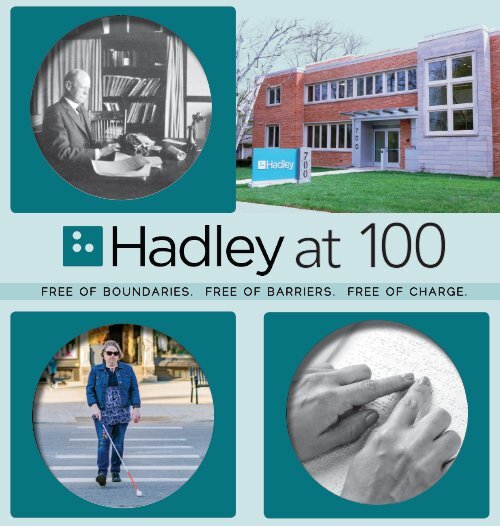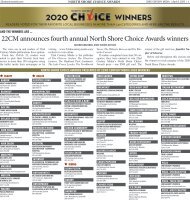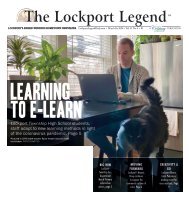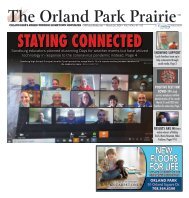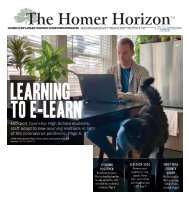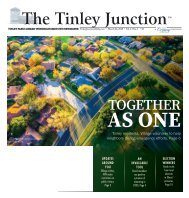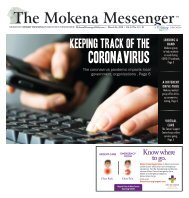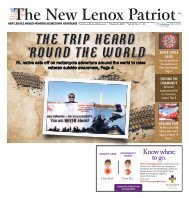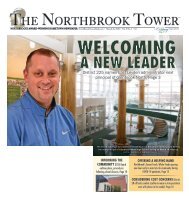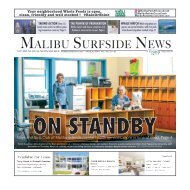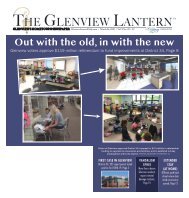Create successful ePaper yourself
Turn your PDF publications into a flip-book with our unique Google optimized e-Paper software.
Free of boundaries. Free of barriers. Free of charge.
2 | January 16, 2020 | 22nd century media <strong>Hadley</strong> at 100<br />
22ndCenturyMedia.com<br />
Celebrating <strong>Hadley</strong>’s <strong>Centennial</strong>:<br />
A Message from Julie Tye<br />
We are excited to commemorate<br />
<strong>Hadley</strong>’s centennial in<br />
2020 and proud to share this<br />
accomplishment with the North<br />
Shore community. We were<br />
born here, in the <strong>Hadley</strong> family<br />
living room on Oak Street<br />
in Winnetka. And, we grew up<br />
here, nurtured by the vision,<br />
leadership and support of local<br />
residents who have championed<br />
<strong>Hadley</strong>’s important work for<br />
100 years. Today, <strong>Hadley</strong> continues<br />
to benefit from the many<br />
local volunteers, staff members<br />
and donors who support our<br />
mission.<br />
For those less familiar with<br />
<strong>Hadley</strong>, we are—and always<br />
have been—a distance learning<br />
organization. This means<br />
our blind and visually impaired<br />
learners do not come to us, we<br />
go to them using the medium<br />
that works best for their individual<br />
needs. This could be<br />
braille, large print, audio or online.<br />
At our headquarters at 700<br />
Elm Street in Winnetka, <strong>Hadley</strong><br />
staff researches and develops<br />
our curriculum, produces and<br />
distributes course materials,<br />
engages and helps our learners,<br />
and raises money to support our<br />
programs. In addition to those<br />
who work onsite, we have experts<br />
offsite who are also helping<br />
to create our curriculum and<br />
work with learners.<br />
Much has changed since<br />
William <strong>Hadley</strong> taught his<br />
first “braille by mail” course<br />
in 1920. However, <strong>Hadley</strong> remains<br />
strong because we have<br />
continuously innovated and<br />
adapted to ensure we are providing<br />
the greatest assistance to<br />
the blind and visually impaired<br />
people who need our services.<br />
As a result, <strong>Hadley</strong> is the largest<br />
educator of braille and provider<br />
of distance education for<br />
people who are blind or visually<br />
impaired worldwide. In fiscal<br />
year 2019, we reached more<br />
than 172,000 learners from all<br />
50 states and 65 countries.<br />
Our goals remain constant: to<br />
Julie Tye, <strong>Hadley</strong> President<br />
empower people who are blind<br />
and visually impaired to thrive<br />
at home, at work, and in their<br />
communities. Following William<br />
<strong>Hadley</strong>’s lead, we take a<br />
personalized approach to this<br />
mission, so our learners get the<br />
help they need, when they need<br />
it. People who are blind or visually<br />
impaired often feel isolated;<br />
at <strong>Hadley</strong> they are part of a<br />
community where they can find<br />
assistance from experts and also<br />
have the opportunity to connect<br />
with others, like themselves,<br />
who are living with vision loss.<br />
<strong>Hadley</strong> also remains fully<br />
committed to maintaining our<br />
100-year history of providing<br />
learning free of charge to blind<br />
and visually impaired people<br />
and their families. Many people<br />
with vision loss are unemployed,<br />
underemployed or living on a<br />
fixed income. Thanks to the generosity<br />
of our donors, cost is not<br />
a barrier to <strong>Hadley</strong> learners.<br />
2020 is a significant year for<br />
<strong>Hadley</strong> for many reasons. In addition<br />
to commemorating our<br />
rich history, we are also reimagining<br />
the organization to best<br />
serve the growing population of<br />
older individuals with vision loss.<br />
I hope you will read on to<br />
learn more about <strong>Hadley</strong> of the<br />
past, present and future.<br />
William <strong>Hadley</strong> and The <strong>Hadley</strong> Correspondence School<br />
“When your life’s ambition has failed you, pick up a new thread of endeavor…make<br />
your renewal of effort count for other people.”<br />
~ William A. <strong>Hadley</strong><br />
The Making of an<br />
Exceptional Educator<br />
William Allen <strong>Hadley</strong> was<br />
born in Mooresville, Indiana, in<br />
1860. He graduated from Earlham<br />
College in 1881 earned his<br />
master’s degree at the University<br />
of Minnesota.<br />
<strong>Hadley</strong> began teaching in Willmar,<br />
MN, where he also served as<br />
the Superintendent of Schools for<br />
a time. He married Jessie Henderson,<br />
a fellow schoolteacher<br />
and worked in Ohio and Peoria<br />
before coming to Chicago’s Lake<br />
View High School.<br />
Along the way, William and<br />
Jessie had two daughters, Margaret<br />
and Emily. Seeking more<br />
space to accommodate their family<br />
of four, the <strong>Hadley</strong>s moved to<br />
913 Oak Street in Winnetka in<br />
1905.<br />
In 1915, <strong>Hadley</strong>’s life was dramatically<br />
altered when a bout of<br />
influenza caused his retina to detach.<br />
Today this could likely be<br />
fixed surgically, but at that time<br />
it meant loss of vision in this eye.<br />
Because he had lost sight in his<br />
other eye in a childhood archery<br />
accident, William <strong>Hadley</strong> became<br />
completely blind at the age of 55.<br />
This was a difficult adjustment.<br />
<strong>Hadley</strong> found great assistance<br />
from his friend and neighbor, Dr.<br />
E.V.L. Brown, a renowned ophthalmologist.<br />
Dr. Brown not only<br />
knew the science of vision loss,<br />
but also the psychology. He recognized<br />
the importance of vision<br />
rehabilitation for recovering selfesteem<br />
and encouraged <strong>Hadley</strong> to<br />
stay active and learn braille.<br />
However, <strong>Hadley</strong> was frustrated<br />
to find that there were virtually<br />
no educational opportunities<br />
for blind people. Motivated by<br />
his love of reading and learning,<br />
he taught himself braille with the<br />
help of his wife, Jessie.<br />
While he learned to accept his<br />
vision loss, he lacked a strong<br />
sense of purpose.<br />
In 1919, fate again intervened in<br />
For the first two years, William<br />
<strong>Hadley</strong> corresponded with his<br />
students from his Winnetka<br />
home at 913 Oak Street.<br />
the form of a Winnetka neighbor.<br />
<strong>Hadley</strong> had struck up a friendship<br />
with Reverend Plumer, who<br />
was spending the summer in Winnetka<br />
with his daughter’s family.<br />
Plumer suggested <strong>Hadley</strong> use his<br />
talents to teach his fellow adult<br />
blind by correspondence courses.<br />
The School is Born<br />
<strong>Hadley</strong> was excited by the<br />
possibilities and enlisted the assistance<br />
of Dr. Brown. Their research<br />
revealed that nothing like<br />
this had ever been done, yet the<br />
need to educate adults with vision<br />
loss was profound. This project<br />
also brought William <strong>Hadley</strong><br />
back to life. He was invigorated<br />
by the challenge and got to work<br />
making it a reality.<br />
By 1920, word of his idea was<br />
spreading. A farmer’s wife in<br />
Kansas wrote to him desperate<br />
to learn braille so she could read<br />
again, and “braille by mail” was<br />
born. She mailed her exercises<br />
to Mr. <strong>Hadley</strong> who corrected and<br />
returned them along with notes<br />
of help and encouragement. This<br />
was the beginning of the close instructor-student<br />
relationships that<br />
is a hallmark of <strong>Hadley</strong> learning.<br />
After this first success, Mr.<br />
<strong>Hadley</strong> was ready to take on<br />
more students. He advertised in<br />
a braille periodical and received<br />
over 100 replies from all 48<br />
states, Canada and China. This<br />
reinforced the significant need<br />
for the services he was offering<br />
and provided direction for the<br />
type of courses to offer.<br />
For the first year, <strong>Hadley</strong> ran<br />
the school out of his living room,<br />
with the help of his wife Jessie, and<br />
the support and encouragement of<br />
Dr. Brown. Using only the modest<br />
means of his teaching pension,<br />
<strong>Hadley</strong> provided education to more<br />
than 60 students free of charge.<br />
This policy of tuition-free education<br />
that Mr. <strong>Hadley</strong> established a<br />
century ago continues to underpin<br />
<strong>Hadley</strong> learning today.<br />
As the years went on, enrollment<br />
and staff grew but Mr. <strong>Hadley</strong><br />
continued to develop, braille<br />
and teach many of the courses<br />
himself as well as writing personal<br />
letters to accompany each<br />
lesson he sent to students.<br />
A Life Well Lived<br />
William <strong>Hadley</strong> remained actively<br />
involved in the School he<br />
created until 1936 when, at the<br />
age of 76, he underwent an operation<br />
that took much of his vigor<br />
and required him to scale back<br />
his teaching.<br />
The year before his death,<br />
<strong>Hadley</strong> reflected upon his life in<br />
an interview with the Chicago<br />
Tribune, remarking: “I had been<br />
a teacher all my life and my work<br />
was not done. I was idle several<br />
years, adjusting myself, but eventually,<br />
I decided that my ability to<br />
teach had not left with my sight.<br />
Now I know that my most valuable<br />
work has been done in the<br />
last 20 years. I am not sorry that I<br />
was made blind.”<br />
William <strong>Hadley</strong> passed away at<br />
the age of 81 on October 2, 1941.
22ndCenturyMedia.com <strong>Hadley</strong> at 100<br />
22nd century media | January 16, 2020 | 3<br />
“Prevention of blindness if possible, if not, then the <strong>Hadley</strong> School.” ~Dr. E.V.L. Brown<br />
Fulfilling the Vision: Dr. E.V.L. Brown<br />
Dr. E.V.L. Brown, with his wife<br />
Frieda, was critical to the launch and<br />
success of <strong>Hadley</strong><br />
Edward Vail Lapham (E.V.L.)<br />
Brown was an important presence<br />
in the life of William <strong>Hadley</strong>. When<br />
<strong>Hadley</strong> first went blind, it was Dr.<br />
Brown—an ophthalmologist and<br />
<strong>Hadley</strong>’s friend and neighbor—who<br />
encouraged him to stay active and<br />
learn braille.<br />
Dr. Brown was also critical to the<br />
founding and success of the <strong>Hadley</strong><br />
School. From the time William <strong>Hadley</strong><br />
first approached him with the idea<br />
of starting a correspondence school,<br />
he provided essential leadership and<br />
counsel to the organization.<br />
While William <strong>Hadley</strong> developed<br />
and brailled the courses and taught<br />
students, Dr. Brown built and managed<br />
an organizational structure that<br />
could provide tuition-free learning to<br />
students. In 1922 he was appointed<br />
to be <strong>Hadley</strong>’s first President of the<br />
Board of Trustees and he would serve<br />
in this role until his death in 1953.<br />
Born in Morrison, IL, in 1896,<br />
Brown studied at Hahneman Medical<br />
School. There, he grew fascinated<br />
by the wonders of the human eye and<br />
continued his studies in this area at<br />
Rush Medical College and the University<br />
of Chicago. Later, his research<br />
would take him to the University of<br />
Berlin and Vienna. He also applied<br />
his German-language skills to translate<br />
scholarly texts, including The<br />
Human Eyeball and The Diseases of<br />
the Eye, into English.<br />
Dr. Brown was an eminent Chicago<br />
ophthalmologist and a dedicated educator.<br />
In addition to private practice,<br />
he taught at Rush Medical College,<br />
the University of Chicago, and the<br />
University of Illinois, and served as<br />
President of the Board of Trustees of<br />
the National Society for the Prevention<br />
of Blindness in Chicago. He also<br />
received many honors throughout his<br />
career, including the highest honor<br />
in his field, the Howe Medal of the<br />
American Ophthalmological Society.<br />
An extremely accomplished man,<br />
Dr. Brown was a dedicated educator,<br />
renowned ophthalmologist and great<br />
humanitarian. His providential friendship<br />
with William <strong>Hadley</strong> launched<br />
The <strong>Hadley</strong> Correspondence School<br />
and his exceptional leadership was<br />
critical to its success.<br />
Dr. Brown’s Family Inherits<br />
a Passion for <strong>Hadley</strong><br />
Dr. Brown’s enthusiasm for <strong>Hadley</strong> was shared<br />
with his family.<br />
His daughter, Nancy, and her husband Clarence<br />
Boyd (Bud) Jones also became involved with the<br />
school in the early 1940s. A few months after Dr.<br />
Brown died, Bud Jones took over as the President of<br />
the Board of Trustees.<br />
When Jones took the reins, the school was in a precarious<br />
financial position, at risk of not meeting the<br />
month’s payroll. He got to work inspiring people about<br />
<strong>Hadley</strong>, getting support from his friends and neighbors<br />
and securing new contributors.<br />
An accomplished lawyer and Secretary of the Diversey<br />
Corporation, Bud was devoted to <strong>Hadley</strong>. He is<br />
remembered for his “wealth of wisdom and practical<br />
know-how” and for working tirelessly to raise <strong>Hadley</strong>’s<br />
profile, spearhead the building campaign and put<br />
the school on firm financial footing. In the 16 years<br />
that he served as board president, <strong>Hadley</strong>’s services,<br />
manpower and income more than quadrupled.<br />
He accomplished much of this in partnership with<br />
his wife, Nancy, who brought great creativity and<br />
energy to help the School. She played a pivotal role<br />
in fundraising, effectively rallying the support of the<br />
Board of Trustees and founding the <strong>Hadley</strong> Woman’s<br />
Board.
4 | January 16, 2020 | 22nd century media <strong>Hadley</strong> at 100<br />
22ndCenturyMedia.com<br />
Community Support Key to <strong>Hadley</strong> Success<br />
<strong>Hadley</strong> director, Dorrance Nygaard,<br />
mans the <strong>Hadley</strong> exhibit at the Lions<br />
Club International Convention in 1950.<br />
<strong>Hadley</strong> learning has always<br />
been free of charge<br />
to people who are blind or<br />
visually impaired and their<br />
families because <strong>Hadley</strong><br />
never wants cost to be a<br />
barrier to our learners.<br />
With this in mind, raising<br />
money to support the<br />
learning and services <strong>Hadley</strong><br />
provides is integral to<br />
what we do—and an important<br />
part of our story.<br />
Winnetka-born<br />
It was the support and<br />
generosity of Winnetka<br />
residents that got <strong>Hadley</strong><br />
off the ground. The first<br />
check <strong>Hadley</strong> received<br />
from outside supporters<br />
was for $1,000 in 1921. It<br />
came from Douglas Smith,<br />
president of the Pepsodent<br />
Company, and Mr.<br />
John Scott, of Carson Pirie<br />
Scott, both of whom lived<br />
in Winnetka and were patients<br />
of <strong>Hadley</strong> co-founder<br />
Dr. E.V.L. Brown.<br />
Many from the local<br />
area gave generously of<br />
their time and money in<br />
the early years – especially<br />
<strong>Hadley</strong>’s Board of Trustees.<br />
When <strong>Hadley</strong> was incorporated<br />
as a non-profit<br />
in 1922, this newly formed<br />
Board provided the financial<br />
support needed to<br />
move operations from the<br />
A proactive approach to aging through empathy,<br />
education and empowerment<br />
The <strong>Hadley</strong> Woman’s Board gathers<br />
for its 2019 Spring Luncheon.<br />
<strong>Hadley</strong>’s living room to a<br />
small second-floor office<br />
at 584 Lincoln Avenue<br />
in Winnetka. Later, their<br />
generosity would keep<br />
<strong>Hadley</strong> going through the<br />
lean years of the Depression,<br />
and donations from<br />
the Board were key to<br />
purchasing the land at 700<br />
Elm Street, where <strong>Hadley</strong><br />
now stands.<br />
It is thanks to the generosity<br />
of countless individuals,<br />
groups and foundations<br />
that <strong>Hadley</strong> can continue to<br />
provide learners with tuition-free<br />
education. There<br />
are too many to name, but<br />
a few stand out.<br />
The Lions Club<br />
Roars into Action<br />
Founded by Chicago<br />
businessman Melvin Jones<br />
in 1917, Lions Club International<br />
is a service club that<br />
counts blindness-related<br />
causes among its projects.<br />
This was inspired by none<br />
other than Helen Keller<br />
who appealed to the Lions<br />
Clubs to become “Knights<br />
of the blind in the crusade<br />
against darkness” when she<br />
addressed their international<br />
convention in 1925.<br />
So, it was fitting and<br />
fortuitous when the newly<br />
chartered Winnetka Lions<br />
Club adopted The <strong>Hadley</strong><br />
Correspondence School<br />
The <strong>Hadley</strong> Teen Board washes<br />
dogs to raise funds for <strong>Hadley</strong>.<br />
for the Blind as its main<br />
project in 1929 and the<br />
beginning of a long and<br />
important relationship for<br />
<strong>Hadley</strong>.<br />
The Winnetka Lions<br />
worked tirelessly to spread<br />
the word about <strong>Hadley</strong>. As<br />
a result, the school gained<br />
the attention and support<br />
of other Lions Clubs<br />
across the state and was<br />
officially adopted by the<br />
Illinois Lions at their State<br />
Convention in 1935.<br />
In 1953, the Lions of<br />
Illinois formalized their<br />
commitment to blindnessrelated<br />
causes with the<br />
forming of the Lions of<br />
Illinois Blind Activities,<br />
which supported <strong>Hadley</strong><br />
among other organizations.<br />
This committee<br />
raised significant funds<br />
through its “Candy Day”<br />
sales. Meanwhile, the<br />
Winnetka Lions raised additional<br />
funds for <strong>Hadley</strong><br />
through an annual Pancake<br />
Breakfast.<br />
When it was time to expand<br />
the <strong>Hadley</strong> building<br />
in 1968, the Lions were<br />
also there. Funds were<br />
raised through memorial<br />
donations, which were in<br />
addition to the Lions’ annual<br />
donation to <strong>Hadley</strong>’s<br />
general fund.<br />
Today, the Lions Club<br />
International continues<br />
to support vision-related<br />
causes and has expanded<br />
this scope to include blindness<br />
prevention and sight<br />
restoration and <strong>Hadley</strong><br />
continues to benefit from<br />
the generosity of Lions<br />
Clubs who donate to help<br />
us fulfill our mission.<br />
The Woman’s Board<br />
Steps Up<br />
In the early years, the<br />
wives of <strong>Hadley</strong>’s founders<br />
and Board of Trustees—including<br />
Mrs. William<br />
<strong>Hadley</strong> and Mrs.<br />
E.V.L. Brown—played<br />
a significant role behind<br />
the scenes helping their<br />
husbands and the School.<br />
In 1953, many of these<br />
women stepped out from<br />
the shadows to formalize<br />
and organize their support<br />
by creating the <strong>Hadley</strong><br />
Woman’s Board.<br />
This move was prompted<br />
by necessity. In 1953 <strong>Hadley</strong><br />
had only $500 left in<br />
Please see Support, 6<br />
HEART2HEART COACHING & CONSULTING<br />
Empowering older adults to remain engaged in<br />
their homes and communities longer, supporting<br />
middle aged adults through difficult transitions, and<br />
inspiring adults of all ages to live their “best life.”<br />
Maureen Kafkis, OTD, Coach & Consultant<br />
Heart2Heart Occupational Therapy<br />
847-881-6036 • heart2heartbestlife.com<br />
heart2heartkafkis@gmail.com
22ndCenturyMedia.com <strong>Hadley</strong> at 100<br />
22nd century media | January 16, 2020 | 5<br />
STORE<br />
CLOSING<br />
Congratulations<br />
<strong>Hadley</strong>.<br />
SALE<br />
We’re Closing Our Doors<br />
and Celebrating Our Next<br />
Great Chapter with<br />
30% OFF<br />
Including Already<br />
Discounted Merchandise<br />
After 67 Years of top-notch service and quality<br />
apparel and toys, Lad & Lassie is closing its<br />
doors for good. Stop in soon as the savings<br />
will last but the merchandise won’t.<br />
Congratulations on your 100 th anniversary.<br />
We salute you and your commitment to the community.<br />
BMO Harris Bank N.A. Member FDIC.<br />
1115 Central Avenue Wilmette, IL. 60091 www.ladandlassie.com
6 | January 16, 2020 | 22nd century media <strong>Hadley</strong> at 100<br />
22ndCenturyMedia.com<br />
What’s<br />
in a<br />
Name?<br />
Support<br />
From Page 4<br />
1920<br />
Founded as<br />
The <strong>Hadley</strong><br />
Correspondence<br />
School for the<br />
Blind<br />
1953<br />
Shortened to The<br />
<strong>Hadley</strong> School for<br />
the Blind<br />
the bank and no immediate plan for<br />
how to make payroll. Nancy Brown<br />
Jones, daughter of founder Dr. E.V.L.<br />
Brown, came up with a solution; “It<br />
would require women, who keep their<br />
shoulder to the wheel,” she explained<br />
in a 1989 interview.<br />
Together with her mother and<br />
other prominent local women, such<br />
as Mrs. Ernest S. Ballard who was<br />
the first chair, the newly formed<br />
Board spent the summer hosting<br />
teas along the North Shore to raise<br />
money for and awareness of <strong>Hadley</strong>.<br />
Soon, the Woman’s Board was<br />
off and running. Nancy Jones remembers,<br />
“We had great strengths<br />
in the early Woman’s Board…They<br />
were unusually capable, bright,<br />
charming and well-organized<br />
women who knew how to get right<br />
to a problem.”<br />
2020 marks 67 years that the <strong>Hadley</strong><br />
Woman’s Board has been working<br />
diligently to fundraise for <strong>Hadley</strong>.<br />
Over the years, Woman’s Board<br />
members have also devoted their<br />
time and talents to <strong>Hadley</strong>, such as<br />
giving tours of the building to visitors,<br />
reading books for audio recordings,<br />
and arranging events.<br />
The Woman’s Board’s success<br />
has made it a special partner and financial<br />
cornerstone for <strong>Hadley</strong>. Every<br />
year, the Woman’s Board sells<br />
Braille Holiday Cards to raise funds<br />
in support of <strong>Hadley</strong>. Started by<br />
Nancy Jones in 1956, the cards always<br />
include a message transcribed<br />
in braille as well as an ink-printed<br />
note. Sending the card has been a<br />
tradition for many families and a<br />
wonderful way to expand the reach<br />
of <strong>Hadley</strong> worldwide.<br />
A large percentage of the Woman’s<br />
Board proceeds are raised through<br />
special events, including an annual<br />
gala that brings the community together<br />
in support of <strong>Hadley</strong>. Over<br />
the years, these affairs have included<br />
dinner dances, casino nights, Kentucky<br />
Derby parties, garden parties,<br />
art sales and wine nights.<br />
This year, the <strong>Hadley</strong> Woman’s<br />
Board and <strong>Hadley</strong> Board of Trustees<br />
are planning a landmark celebration<br />
in honor of <strong>Hadley</strong>’s centennial. This<br />
fun and festive evening is scheduled<br />
for April 4, 2020 at The Dalcy in<br />
Chicago’s Fulton Market. To be a<br />
sponsor, purchase tickets or learn<br />
more about the event, contact sara@<br />
hadley.edu or call 847-784-2876.<br />
If you are interested in joining or<br />
would like more information about<br />
the <strong>Hadley</strong> Woman’s Board, contact<br />
Suzy Parks, <strong>Hadley</strong> Woman’s Board<br />
President, at suzyparks@messinagroupinc.com<br />
or 847-274-3202.<br />
2015<br />
Renamed <strong>Hadley</strong><br />
Institute for the<br />
Blind and Visually<br />
Impaired<br />
2020<br />
Known as <strong>Hadley</strong><br />
Friends of <strong>Hadley</strong><br />
In 1974, the Woman’s Board gave<br />
rise to the Friends of <strong>Hadley</strong>. The<br />
Friends were focused on supporting the<br />
school’s unique educational programs,<br />
helping <strong>Hadley</strong> students on an individual<br />
basis and addressing specific causes.<br />
For example, in the aftermath of<br />
Hurricane Katrina, the Friends of<br />
<strong>Hadley</strong> helped a student who was<br />
without a home, personal belongings<br />
and, most importantly, her personal<br />
computer which she needed to continue<br />
her employment. By pooling<br />
resources, they wrote a check toward<br />
the purchase of a new computer<br />
monitor and adaptive software so she<br />
could return to work.<br />
In 2006, this group won the American<br />
Council of the Blind’s prestigious<br />
James R. Olsen Distinguished Service<br />
Award, which recognizes people or<br />
organizations that have demonstrated<br />
exceptional service to others.<br />
<strong>Hadley</strong> Teen Board<br />
The <strong>Hadley</strong> Teen Board is comprised<br />
of high school age kids from<br />
the North Shore area. The group<br />
plans and organizes a variety of fundraisers<br />
for <strong>Hadley</strong>—including the<br />
Memorial Day Dog Wash held in the<br />
<strong>Hadley</strong> parking lot by the Winnetka<br />
Village Green. To find out more,<br />
contact Suzette Bernstein at suzettebernstein@comcast.net.<br />
A Lifelong Affiliation<br />
Drives Sarah Barden<br />
Sarah with her niece,<br />
Annie.<br />
Sarah Barden’s affiliation<br />
with <strong>Hadley</strong> dates<br />
back nearly 50 years to<br />
when, as an 8th grader<br />
living in Wilmette, she<br />
met Dr. Richard Kinney,<br />
one of the organization’s<br />
pioneers. He made an impact<br />
that she still recalls<br />
today.<br />
Sarah graduated from<br />
Miami of Ohio University<br />
with a double major<br />
in learning disabilities<br />
and elementary education<br />
and taught in that field.<br />
She and her husband have<br />
since raised their own<br />
family in Northbrook.<br />
In 1992, Sarah became<br />
reacquainted with <strong>Hadley</strong><br />
when she joined the<br />
Woman’s Board. Like<br />
many members, her interest<br />
was largely social.<br />
She enjoyed being part of<br />
this group that does good<br />
work in the community.<br />
However, Sarah’s connection<br />
became more<br />
personal when her niece,<br />
Annie, was born with<br />
blindness caused by retinopathy<br />
of prematurity.<br />
Sarah explains, “Annie’s<br />
story has given me<br />
more of a drive to make<br />
sure that the visuallyimpaired<br />
population of<br />
our society is served, accepted,<br />
and totally mainstreamed.”<br />
In addition to being<br />
a past Woman’s Board<br />
President, Sarah is a <strong>Hadley</strong><br />
Trustee and co-chair<br />
for <strong>Hadley</strong>’s Education<br />
and <strong>Centennial</strong> Committees.<br />
She is proud that the<br />
Woman’s Board works<br />
tirelessly to uphold <strong>Hadley</strong>’s<br />
mission. “We’ve<br />
stayed focused on that.<br />
Our delivery, our technology,<br />
and all of the services<br />
we provide; we just<br />
continue to get better and<br />
better as an organization<br />
as a whole.”<br />
Congratulations<br />
on a Century of Seeing New Possibilities<br />
Congratulations, <strong>Hadley</strong><br />
on 100 years of helping others!<br />
JOHN J. SKOWRON, JR., D.D.S., M.S.<br />
(847) 446-0970<br />
Fax: (847) 446-0979<br />
skowrondental.com<br />
BY APPOINTMENT<br />
575 LINCOLN AVENUE<br />
WINNETKA, ILLINOIS 60093
22ndCenturyMedia.com <strong>Hadley</strong> at 100<br />
22nd century media | January 16, 2020 | 7<br />
1920 - 2020<br />
HAPPY<br />
100th<br />
HADLEY!<br />
From your<br />
long-time<br />
friends at<br />
BRATSCHI PLUMBING<br />
Glasses for <strong>Hadley</strong> Collection Box<br />
at Bratschi Plumbing<br />
Established in Winnetka<br />
in 1937<br />
Walter Bratschi arranging books<br />
at <strong>Hadley</strong><br />
Phil Hoza Jr. in the<br />
Winnetka 4th of July<br />
Parade<br />
801 OAK STREET, WINNETKA/847-446-1421<br />
Lic. 055-004618<br />
CHICAGO . WINNETKA<br />
847. 271 . 9857<br />
redspadeenvironments.com
8 | January 16, 2020 | 22nd century media <strong>Hadley</strong> at 100<br />
22ndCenturyMedia.com<br />
<strong>Hadley</strong> Goes International<br />
From the very beginning, <strong>Hadley</strong> attracted<br />
interest from blind and visually<br />
impaired students around the world.<br />
While the “braille by mail” model allowed<br />
<strong>Hadley</strong> to serve international<br />
students, it was not a fast process given<br />
distance and geographical barriers.<br />
In 1959, Director Donald Hathaway<br />
and Assistant Director Richard Kinney<br />
attended the Fifth World Assembly of<br />
the World Council for the Welfare of<br />
the Blind in Rome. While there, they<br />
were approached by Latin American<br />
delegates who wished to replicate <strong>Hadley</strong><br />
in their countries.<br />
This was the beginning of <strong>Hadley</strong><br />
International. Under this new initiative,<br />
<strong>Hadley</strong> partnered with local agencies<br />
for the blind to open satellite offices in<br />
key regions of the world. This enabled<br />
<strong>Hadley</strong> to overcome linguistic barriers<br />
and deliver resources more efficiently.<br />
In the 1960s, <strong>Hadley</strong> expanded<br />
across the globe—with offices in Argentina,<br />
Brazil, Canada, China, Colombia,<br />
France, Greece, India, Italy, Israel,<br />
Kenya, Mexico, Spain and Turkey.<br />
The international curriculum mirrored<br />
<strong>Hadley</strong> Central’s approach, primarily<br />
teaching English through the local<br />
language in braille, by mail. Across<br />
the markets there was also an emphasis<br />
on vocational courses.<br />
By the 1990s, new web-enabled<br />
technologies meant learning materials<br />
could be delivered more efficiently<br />
from a central location. The rising cost<br />
and complexity of maintaining operations<br />
abroad led to closing international<br />
offices in Europe in 1992 and the last<br />
locations in South America and Latin<br />
America in 2000. China was the exception<br />
and remained open until 2012.<br />
Today, <strong>Hadley</strong> continues to serve<br />
people who are blind and visually impaired<br />
around the world. In 2019 we<br />
reached learners in more than 65 countries.<br />
<strong>Hadley</strong>’s distance learning model<br />
and digital technology make it a seamless<br />
process, with learning accessible<br />
around the clock from any location.<br />
Learning Experts Are <strong>Hadley</strong>’s True Heroes<br />
Unless you’ve gone<br />
through it, it’s difficult to<br />
imagine losing your vision<br />
and having the confidence to<br />
continue living independently.<br />
<strong>Hadley</strong>’s learning experts<br />
are essential to helping learners<br />
navigate this new reality.<br />
Charmaine Martin, learning<br />
expert and practice leader for<br />
the Adjustment, Independent<br />
Living, and Recreation Team<br />
explains, “People who call<br />
are often scared and anxious<br />
and simply want to know that<br />
life can go on. We tell them<br />
they can still do things they<br />
normally do, but that they just<br />
have to learn how to do them<br />
in a different way, and we can<br />
help get them there.”<br />
She adds, “you can feel the<br />
anxiousness of the caller but<br />
also the relief once they hear<br />
what we have to offer in the<br />
way of assistance, and that<br />
we will be there to help guide<br />
them every step of the way.”<br />
It is most frequently an<br />
older individual who has experienced<br />
recent vision loss<br />
who reaches out to see what<br />
<strong>Hadley</strong> can offer. Because<br />
their literacy is already there<br />
and they are not yet at a stage<br />
when they want to learn<br />
braille, most are simply seeking<br />
tips and tricks on how to<br />
navigate through their new<br />
life and the experiences that<br />
come with it.<br />
“And they want it quickly,”<br />
Martin explains. “We’re in the<br />
age of YouTube, when people<br />
don’t want to sit through a<br />
long course to learn about independent<br />
living. They want<br />
the information at their fingertips<br />
and want it now. <strong>Hadley</strong>’s<br />
new platform is being<br />
developed to deliver the ‘just<br />
in time’ type of education our<br />
learners are seeking.”<br />
While <strong>Hadley</strong>’s online<br />
discussion groups provide<br />
an enormous sense of community<br />
for those living with<br />
low vision, it’s the learning<br />
experts who are on the front<br />
lines every day, communicating<br />
in real-time, making a<br />
difference in people’s lives.<br />
Whether it’s tips on shaving,<br />
navigating the kitchen, or<br />
even how to locate a pair of<br />
dropped glasses without stepping<br />
on them, Martin and her<br />
fellow <strong>Hadley</strong> experts are always<br />
there to provide support.<br />
“People come to us at different<br />
stages (of vision loss),”<br />
she explains. “When blindness<br />
hits, you want to know<br />
that what you’re feeling is<br />
normal. Just like you grieve<br />
for the loss of a family member,<br />
you can grieve for the<br />
loss of your vision.”<br />
For Martin, it is an “amazing<br />
feeling” to see how<br />
someone struggling in the<br />
beginning learns to adjust.<br />
She affirms this feeling also<br />
extends to sighted individuals<br />
when they’ve learned to help<br />
their loved one regain their<br />
independence.<br />
Congratulations <strong>Hadley</strong> on 100 years!<br />
<br />
<br />
<br />
<br />
<br />
Clune is proud to support <strong>Hadley</strong> and<br />
its mission to provide education and<br />
resources that enable people with visual<br />
impairments to thrive.<br />
CONGRATULATIONS<br />
ON 100 YEARS OF<br />
EMPOWERMENT!<br />
To learn more please visit: us.jll.com
22ndCenturyMedia.com <strong>Hadley</strong> at 100<br />
22nd century media | January 16, 2020 | 9<br />
<strong>Hadley</strong> Addresses the<br />
Changing Face of Vision Loss<br />
Improved prevention, detection and treatments<br />
have resulted in fewer children experiencing<br />
vision loss. However, at the other end<br />
of the age spectrum, vision loss is a growing<br />
concern. As the baby-boomer population<br />
ages, visual impairments caused by eye diseases—such<br />
as age-related macular degeneration,<br />
diabetic retinopathy and glaucoma—<br />
are on the rise.<br />
Poor visual acuity is just the beginning of<br />
the challenges these individuals will face. Impaired<br />
sight makes medication management<br />
precarious. Getting around in public, or even<br />
one’s own home, becomes unsafe. Cutting<br />
food and cooking a meal turns hazardous.<br />
The loss of independence and lack of mobility<br />
that accompany vision loss frequently<br />
lead to increased isolation, depression and a<br />
reduced quality of life.<br />
There is an urgent need to support the<br />
millions of older individuals new to vision<br />
loss.<br />
In the United States, vision rehabilitation<br />
is provided as a social service. People in need<br />
of assistance are typically referred to staterun<br />
agencies, but these organizations are<br />
often oversubscribed and underfunded and<br />
simply cannot provide the type, volume or<br />
speed of support that is needed.<br />
Nor is the medical community set up to<br />
help. Vision rehab has never fallen under the<br />
medical model. Once there is nothing left to<br />
do to treat the underlying disease or restore<br />
vision, people are usually left in the cold,<br />
without assistance or support.<br />
How Is <strong>Hadley</strong> Helping?<br />
As the largest provider of distance education<br />
for people who are blind and visually impaired<br />
worldwide, <strong>Hadley</strong> is uniquely qualified<br />
to serve this growing population. We are<br />
doing this by bringing together our esteemed<br />
100-year history with new technological capabilities<br />
to deliver the most impactful learning<br />
experiences.<br />
<strong>Hadley</strong>’s distance learning model allows<br />
us to be there to help people facing visual impairment<br />
through this challenging transition.<br />
It might take months to see a vision rehab<br />
counselor at a state-run agency but <strong>Hadley</strong><br />
learning and learning experts are available<br />
immediately. <strong>Hadley</strong> learners have access<br />
to personalized learning experiences in the<br />
Please see VISION LOSS, 11<br />
WE’RE PROUD TO SUPPORT<br />
HADLEY<br />
INSTITUTE FOR THE BLIND<br />
AND VISUALLYIMPAIRED<br />
Congratulations on your 100thanniversary!<br />
Discussion Groups<br />
Creating a Sense of Community Engagement<br />
Visual impairment is often isolating.<br />
Compromised sight can make it difficult to<br />
travel and get around in public leading to a<br />
loss of independence, established routines<br />
and engagement with the outside world. According<br />
to The Global Coalition on Aging,<br />
low vision has also been shown to result in a<br />
9.5 times greater risk of Alzheimer’s disease<br />
and a 200% increase in clinical depression.<br />
Staying connected is critical—and something<br />
that <strong>Hadley</strong> learners are eager to do.<br />
So, <strong>Hadley</strong> recently launched a series of<br />
Discussion Groups where learners can interact<br />
with others who share their interests<br />
and learn from others who are facing similar<br />
challenges.<br />
<strong>Hadley</strong> Discussion Groups are free of<br />
charge and open to anyone with a visual<br />
impairment, their family members, and<br />
even medical professionals. These forums<br />
allow learners—who are spread out across<br />
the country and around the world— to gain<br />
knowledge, share information, connect with<br />
one another and build community. Subjects<br />
capture learners’ broad range of interests and<br />
needs. Whatever the pursuit, it is likely that<br />
<strong>Hadley</strong> has a discussion group for it. Topics<br />
include: Tech it Out, <strong>Hadley</strong> Growers, Spanish<br />
Chat, What’s Cooking, Resource Roundtable,<br />
Get Up & Go, Crafting, Embracing<br />
Braille and Writers’ Circle.<br />
Discussion groups are also an important<br />
component of <strong>Hadley</strong>’s new workshop format.<br />
They provide a valuable avenue for<br />
‘social learning’ that, research and experience<br />
reveal, is critical to people with low vision.<br />
If learners are not able to join the live<br />
conversation, they can access the discussion<br />
content after the fact by downloading the<br />
transcript or listening to the audio recording.<br />
Topics are timely and seasonal—such as<br />
how to cook a Thanksgiving turkey or online<br />
shopping for holiday gifts.<br />
Feedback from learners has been excellent.<br />
They enjoy the cross-section of people<br />
who participate, the ability to ask questions<br />
of experts and the group, and the opportunity<br />
to share their own tips and experiences.<br />
Visit hadley.edu/discussions to browse all<br />
of the discussion groups. Click ‘Tune In’ to<br />
view upcoming topics, times to join in and<br />
access past sessions.<br />
Being your community bank means doing our part togive back<br />
to the local charities and social organizations that unite and<br />
strengthen our area. We’re particularly proud to support the<br />
<strong>Hadley</strong> Institute and its dedication to providing personalized<br />
learning opportunities thatempowerpeople to thrive–athome,<br />
at work,and in their communities.<br />
WINNETKA’S COMMUNITYBANK<br />
576Lincoln Ave. |Winnetka, IL 60093<br />
847-441-2265 |www.nscbank.com<br />
North ShoreBank &Trust Company is abranchofWintrust Bank,N.A.<br />
Proud to be part of the<br />
family
10 | January 16, 2020 | 22nd century media <strong>Hadley</strong> at 100<br />
22ndCenturyMedia.com<br />
Forsythe Center Helps People with Low Vision Get Back into the Workforce<br />
Unemployment among people<br />
with disabilities is a serious issue,<br />
and this is especially true<br />
for people with visual impairments.<br />
The National Federation<br />
of the Blind reports that over<br />
70% of working age adults with<br />
significant vision loss are not<br />
employed full time.<br />
And the situation is expected<br />
to only worsen.<br />
The National Eye Institute<br />
projects a dramatic increase in<br />
the number of Americans with<br />
low vision, from 2.9 million in<br />
2010, to 5 million in 2030, and<br />
to nearly 9 million in 2050. Although<br />
low vision can occur at<br />
any age, most people with low<br />
vision are over 60 years old.<br />
“Because this generation will<br />
live longer, many will strive for<br />
years to keep their jobs and live<br />
independently with low vision,”<br />
explains Colleen Wunderlich,<br />
director of <strong>Hadley</strong>’s Forsythe<br />
Center for Employment & Entrepreneurship.<br />
“I’m concerned<br />
Forsythe Center Director Colleen<br />
Wunderlich and her guide dog<br />
Nora with Sandy Forsythe.<br />
because society is not prepared<br />
for the increasing numbers of<br />
people who will lose their vision<br />
10 to 20 years down the road. It’s<br />
been a silent epidemic for a long<br />
time.”<br />
Through the Forsythe Center,<br />
<strong>Hadley</strong> offers tuition-free courses<br />
and online modules that focus<br />
on business planning, marketing,<br />
basic accounting and financial<br />
statement preparation.<br />
“Whether someone is seeking<br />
a job, wanting a better job, or aspiring<br />
to be their own boss, we<br />
help develop the business skills<br />
needed to be successful,” explains<br />
Ms. Wunderlich, who has<br />
been with <strong>Hadley</strong> since 2013 and<br />
has been blind since birth.<br />
Each year, the Forsythe Center<br />
awards $30,000 in grant<br />
money to deserving individuals<br />
through its ‘New Venture’ competition<br />
for entrepreneurship.<br />
Wunderlich realized the need for<br />
this competition a few years ago<br />
when she was teaching a <strong>Hadley</strong><br />
course on business plans and<br />
started seeing a lot of people’s<br />
business plans come through.<br />
She recalled the “courses to prepare<br />
people for business planning<br />
and competition” when she<br />
earned her MBA at the University<br />
of Chicago Booth School of<br />
Business and set out to create a<br />
similar opportunity for <strong>Hadley</strong><br />
learners.<br />
The funding for this award<br />
comes from Sandy and Richard<br />
Forsythe, who also provided the<br />
seed money to start the Forsythe<br />
Center at <strong>Hadley</strong> in 2011.<br />
Last year’s winner, Darrel Kirby,<br />
is using this award money to<br />
build his own multidisciplinary<br />
behavioral healthcare practice.<br />
(See Kirby’s story on page 11.)<br />
“It blows my mind and is simply<br />
astounding that there are<br />
people out there like Darrel who<br />
are able to do what they do,” said<br />
Sandy Forsythe, who joined the<br />
<strong>Hadley</strong>’s Woman’s Board shortly<br />
after moving to Winnetka in<br />
1983. “Knowing our name is at<br />
the forefront of this program is<br />
such a great feeling. We recognize<br />
that it is working and has<br />
helped so many people.”<br />
Sandy knows the difficulties<br />
that come with living with a<br />
loved one with vision loss. Her<br />
husband, Rick, who started his<br />
own company, Forsythe Technologies<br />
in 1971, developed<br />
macular degeneration in 2004 at<br />
the age of 65.<br />
“The one thing that I’ve<br />
learned about blindness and<br />
people is that they want their<br />
dignity, they want to contribute<br />
to society, and plain and simple,<br />
they want a job,” adds Forsythe.<br />
“We are thankful to help open<br />
this door to them.”<br />
As the only program of its<br />
kind, the Forsythe Center for<br />
Employment & Entrepreneurship<br />
is continually growing and<br />
developing new coursework to<br />
go along with a new online portal.<br />
Wunderlich gleams with pride<br />
when asked about the Forsythe<br />
Center’s accomplishments. “I’m<br />
proud of our entrepreneurs,” she<br />
says. “They make this program<br />
successful. We are so honored to<br />
have touched well over 200 businesses<br />
in different phases of the<br />
development process.”<br />
For more information on the<br />
Forsythe Center for Employment<br />
& Entrepreneurship, visit<br />
https://www.hadley.edu/fce or<br />
call (800) 323-4238.<br />
Corbin Capital Partners, L.P.<br />
is pleased to honor the work of the<br />
We are proud to support <strong>Hadley</strong>. We applaud<br />
the organization’s mission to create personalized<br />
<br />
new skills, and empower people to thrive.<br />
<strong>Hadley</strong> Institute for the Blind<br />
and Visually Impaired<br />
by supporting its<br />
<strong>Centennial</strong> Celebration<br />
333 W. Wacker Drive | 6th Floor<br />
Chicago, IL 60606<br />
(312) 818-4300<br />
2801 Lakeside Drive | 3rd Floor<br />
Bannockburn, IL 60015<br />
(847) 374-0400<br />
© 2019 FGMK, LLC ALL RIGHTS RESERVED.<br />
VISIT US<br />
FGMK.COM<br />
An Active Approach to Hedge Fund Investing<br />
www.corbincapital.com
22ndCenturyMedia.com <strong>Hadley</strong> at 100<br />
22nd century media | January 16, 2020 | 11<br />
Iowa City Man Wins 2019 New Venture Competition<br />
When Darrel Kirby was<br />
a junior at the University<br />
of Iowa his life was turned<br />
completely upside down.<br />
Studying to earn a degree<br />
in psychology, Kirby, a diabetic<br />
since childhood, began<br />
losing his sight and within a<br />
few months would be completely<br />
blind due to detached<br />
retinas that didn’t respond to<br />
treatment.<br />
“The most difficult part<br />
of going blind is losing your<br />
independence. I was devastated,”<br />
said Kirby.<br />
Kirby left school and returned<br />
home, hoping for<br />
answers but became isolated<br />
and depressed. “(Before losing<br />
my sight) I was sociable,<br />
had a lot of friends, was<br />
willing to take risks and try<br />
all sorts of new adventures,”<br />
he explained. “Suddenly,<br />
I was scared to do those<br />
things. I was scared to leave<br />
my apartment, and friends<br />
didn’t know how to interact<br />
Darrel Kirby accepts his<br />
award at <strong>Hadley</strong>’s 2019<br />
Student Awards.<br />
with me.”<br />
Eventually, he found help<br />
and inspiration from others<br />
in the blindness community,<br />
giving him the motivation<br />
to return to school and<br />
reimagine his life. He also<br />
learned that he didn’t necessarily<br />
have to give up on all<br />
of the dreams he had before<br />
he lost his vision.<br />
Darrel returned to school,<br />
earned his master’s degree<br />
in social work and became<br />
a licensed independent social<br />
worker and certified<br />
drug and alcohol counselor.<br />
Over the next eleven years<br />
he worked as a counselor at<br />
agencies in the Iowa City<br />
area.<br />
These were positive and<br />
rewarding experiences, but<br />
Darrel aimed to move into<br />
private practice because it<br />
allows for greater flexibility,<br />
improved financial prospects<br />
and the opportunity to<br />
work with clients long-term.<br />
He also recognized that Iowa<br />
City needs more therapists<br />
with experience working<br />
with college students, expertise<br />
handling issues such as<br />
substance abuse and eating<br />
disorders, and with diverse<br />
identities and backgrounds.<br />
So, Darrel joined forces with<br />
a colleague to start Thrive<br />
Behavioral Health, LLC.<br />
<strong>Hadley</strong>’s Forsythe Center<br />
was key to making this a reality.<br />
As he describes it, “My<br />
vision and this dream were<br />
the outline and it was like<br />
someone gave me crayons,<br />
and I was coloring it in, and<br />
it was coming to life. Now, I<br />
am so much better prepared<br />
and have a sense of where<br />
we are going because of the<br />
detail and direction that the<br />
courses demanded of me.”<br />
In June of 2019, Kirby<br />
won the <strong>Hadley</strong> ‘New Venture<br />
Competition’ for his<br />
business plan and $30,000<br />
in prize money. Kirby will<br />
use this award to grow the<br />
business. He shares, “it will<br />
help us to hire the qualified<br />
therapists we want to attract<br />
and will help Thrive<br />
be the business that I really<br />
want it to be.”<br />
However, the experience<br />
goes beyond the prize<br />
money. Darrel states, “No<br />
matter what happened with<br />
the competition, discovering<br />
<strong>Hadley</strong> and completing the<br />
classes and having the business<br />
plan was an enormous<br />
gift.”<br />
VISION LOSS<br />
From Page 9<br />
comfort and convenience of<br />
their homes. And, because<br />
they also have the opportunity<br />
to learn from and interact<br />
with others across the<br />
<strong>Hadley</strong> community through<br />
our forums and discussion<br />
groups, the experience of vision<br />
loss becomes less lonely<br />
and isolating.<br />
Scheduled to launch in<br />
spring 2020, <strong>Hadley</strong>’s updated<br />
learning platform<br />
will feature offerings tailored<br />
to meet the needs of<br />
older adults new to vision<br />
loss. These dynamic, engaging<br />
and interactive experiences<br />
will allow learners<br />
to go at their own pace,<br />
practice their knowledge<br />
and learn through scenariobased<br />
settings with real-life<br />
applications.<br />
Help will be immediate<br />
to donate<br />
please visit<br />
and accessible so learning<br />
can begin right away. Resources<br />
will be available<br />
24/7 from the comfort and<br />
convenience of the learner’s<br />
home. When assistance is<br />
needed, <strong>Hadley</strong> learning experts<br />
will be there. And, as<br />
always, this learning will be<br />
free of charge to people with<br />
vision loss and their families.<br />
While <strong>Hadley</strong> expands its<br />
focus to assist the growing<br />
population of older adults<br />
new to vision loss, we will<br />
also enhance the learning experience<br />
for all the people we<br />
have been serving for the past<br />
century. We are always improving<br />
and are committed to<br />
meeting learners where they<br />
live and where they are—<br />
with applicable knowledge<br />
and practical solutions to help<br />
them thrive at work, at home<br />
and in their communities.<br />
www.<strong>Hadley</strong>.edu/2020<br />
<strong>Hadley</strong>, 700 Elm Street, Winnetka, IL 60093
12 | January 16, 2020 | 22nd century media <strong>Hadley</strong> at 100<br />
22ndCenturyMedia.com<br />
Technology: Past, Present and Future<br />
Technology has had a powerful<br />
impact on the lives of people who<br />
are blind and visually impaired—<br />
and on the possibilities for distance<br />
learning. For the past century,<br />
<strong>Hadley</strong> has been on the forefront<br />
of these developments, embracing<br />
technology to improve our ability<br />
to reach and teach those in need of<br />
our services, and to enhance the<br />
quality and experience of the learning<br />
it provides.<br />
The Early Years<br />
In the 1920s, when <strong>Hadley</strong> was<br />
first founded, braille textbooks<br />
were produced one-at-a-time on<br />
braille writers, making for a timeand<br />
labor-intensive process. In<br />
these early days, William <strong>Hadley</strong><br />
wrote and produced most of these<br />
himself, even once more staff was<br />
hired to assist.<br />
So, when braille presses came<br />
on the scene in the 1930s, it was<br />
transformative for the school. The<br />
ability to produce textbooks much<br />
more efficiently enabled <strong>Hadley</strong> to<br />
expand its student base and course<br />
offerings.<br />
Alfred Allen was hired in 1922<br />
to be William <strong>Hadley</strong>’s “right hand<br />
man” and manage the business affairs<br />
of the school. Allen was also<br />
an innovator who developed a<br />
braille press with an accompanying<br />
stereotyping machine that produced<br />
zinc plates from which the<br />
books could be printed. This sped<br />
up production of textbooks so the<br />
school could keep pace with the<br />
growing demand.<br />
Allen also pioneered the idea of<br />
the “Talking Book” in the 1930s,<br />
which sent recordings and record<br />
players to students. Since many<br />
students did not yet have access<br />
to electricity, these machines were<br />
spring loaded. This initiative inspired<br />
the Talking Book program<br />
the Library of Congress launched<br />
later, which loaned electric players<br />
to students to use.<br />
When <strong>Hadley</strong>’s new building<br />
was constructed in 1957, it included<br />
an audio recording studio.<br />
This gave the school the ability<br />
and flexibility to produce these<br />
learning materials in-house. It also<br />
brought many broadcasting personalities,<br />
such as Shirley Cole of<br />
“Little Orphan Annie” fame, to<br />
<strong>Hadley</strong> to record course material.<br />
In the late 1950s, the Thermoform<br />
Braille Duplicator revolutionized<br />
printing. Books could be<br />
produced for a fraction of the cost<br />
of printing them on a large braille<br />
press and materials could be updated<br />
more efficiently and easily.<br />
<strong>Hadley</strong> updated its recording<br />
studio in the 1980s, enabling<br />
learning materials to be captured<br />
and shared on cassette tape. Celebrities,<br />
such as Sammy Davis,<br />
Jr. and George Shearing, read and<br />
recorded books and magazines for<br />
<strong>Hadley</strong>. Future enhancements including<br />
a teleprompter, powerful<br />
computers and digital sound editing<br />
software allowed <strong>Hadley</strong> staff<br />
to digitally master, edit and duplicate<br />
recordings in house.<br />
<strong>Hadley</strong>’s early<br />
braille reproduction<br />
machines were<br />
simple presses with<br />
zinc plates.<br />
Personal Computers<br />
and the Internet<br />
The 1990s brought the personal<br />
computer and, since then, the speed<br />
of technology has accelerated exponentially<br />
to open new doors and<br />
opportunities for people who are<br />
blind and visually impaired.<br />
One of the most significant developments<br />
was the screen reader,<br />
a software program that enables<br />
a blind or visually impaired user<br />
to read text on a computer screen<br />
Charles Shipley, <strong>Hadley</strong> recording studio<br />
engineer, records Shirley Cole, a wellknown<br />
Chicago broadcaster who voiced<br />
Annie on the “Little Orphan Annie” radio<br />
show, in 1957<br />
with a speech synthesizer or braille<br />
display. This allowed <strong>Hadley</strong> students<br />
and teachers to correspond<br />
and share materials electronically.<br />
While computers and screen readers<br />
were prohibitively expensive<br />
for many in the early years, today,<br />
nearly every program has major<br />
accessibility options built right in.<br />
Then came the Internet. <strong>Hadley</strong><br />
launched online learning, or<br />
Please see future, 13<br />
<strong>Hadley</strong> creates personalized learning opportunities that empower people<br />
with vision loss to thrive – at home, at work and in their communities.<br />
CONGRATULATIONS<br />
on 100 years of helping people thrive!<br />
<strong>Hadley</strong> Capital invests to help small companies achieve their<br />
goals with ahighly collaborative approach and along-term view.
22ndCenturyMedia.com <strong>Hadley</strong> at 100<br />
22nd century media | January 16, 2020 | 13<br />
future<br />
From Page 12<br />
“e<strong>Hadley</strong>,” in 2001, beginning<br />
with a course on “internet basics.”<br />
e<strong>Hadley</strong> quickly gained steam and<br />
more materials were rolled out<br />
over the following years.<br />
Seminars@<strong>Hadley</strong> was launched<br />
in 2006. This popular series of free,<br />
online sessions was made available<br />
to learners around the world<br />
and was the precursor to <strong>Hadley</strong><br />
Presents podcasts and Discussion<br />
Groups offered today.<br />
In 2012, <strong>Hadley</strong> introduced a series<br />
of videos about how to use the<br />
accessibility features of the iPhone<br />
and other Apple products. <strong>Hadley</strong><br />
has been building this library continuously<br />
and it has recently been<br />
expanded to include Android products<br />
as well. You can find these on<br />
the <strong>Hadley</strong> website (https://hadley.<br />
edu/InstructionalVideos/).<br />
Looking to the Future: Workshops<br />
Now, <strong>Hadley</strong> is putting the<br />
technology in place for our next<br />
century. We are transforming the<br />
manner in which we offer our education<br />
going forward so we can<br />
best serve the growing population<br />
of people facing vision loss and<br />
empower them to meet the challenges<br />
ahead.<br />
For this, <strong>Hadley</strong> is redeveloping<br />
its traditional programming<br />
into dynamic online workshops.<br />
Course materials are being portioned<br />
into digestible, interactive<br />
experiences. For those learners<br />
who prefer, these materials will<br />
also be available in braille, audio<br />
and large print.<br />
With a multimedia approach<br />
and interactive formats, this new<br />
platform will let learners move<br />
at their own pace, practice their<br />
knowledge and learn through scenario-based<br />
settings with real-life<br />
applications. It will also accommodate<br />
individual vision conditions<br />
through customized settings<br />
and will tailor content and make<br />
recommendations based upon<br />
user interactions.<br />
<strong>Hadley</strong> learning experts and<br />
learning developers are currently<br />
working diligently to bring this<br />
vision to life for rollout in spring<br />
2020.<br />
<strong>Hadley</strong> Partners with Technology Leaders on Accessibility<br />
When Doug Walker joined the<br />
<strong>Hadley</strong> staff to focus on assistive<br />
technology approximately eight<br />
years ago, <strong>Hadley</strong> learners were<br />
eager to learn about iPhone accessibility.<br />
So, he rigged up a recording<br />
studio in his Nashville, TN, home<br />
office and got to work videotaping<br />
a series of tutorials that could be<br />
shared through <strong>Hadley</strong>’s website.<br />
This was just the beginning.<br />
<strong>Hadley</strong> learners loved this platform,<br />
so Walker upgraded his<br />
production studio and continued<br />
to create videos on iPhone accessibility<br />
features—such as VoiceOver<br />
and Magnifier. Then, he expanded<br />
the curriculum to include tutorials<br />
for the Mac.<br />
Apple took notice. Sarah Herrlinger,<br />
Apple’s director of global<br />
accessibility policy & initiatives,<br />
contacted <strong>Hadley</strong> about forming a<br />
relationship wherein <strong>Hadley</strong> would<br />
be featured on their website as a goto<br />
resource for accessibility. Since<br />
then, this relationship has continued<br />
to flourish. <strong>Hadley</strong>’s tutorial library<br />
now covers how to use accessibility<br />
features on a full range of<br />
Doug Walker presents on<br />
accessibility features at<br />
Chicago’s Apple Store<br />
Apple products—including Apple<br />
TV, Apple Watch and iPad.<br />
Doug Walker has also presented<br />
at Apple on vision accessibility<br />
on multiple occasions. And, when<br />
Apple needed to teach visually impaired<br />
individuals how to use Swift<br />
Playgrounds as part of their “Everyone<br />
Can Code” initiative, they<br />
reached out to <strong>Hadley</strong> for help.<br />
Because accessibility features<br />
were built right into Apple’s software,<br />
this was the logical place for<br />
<strong>Hadley</strong> to start teaching. However,<br />
since then, other technology companies<br />
have followed suit—and<br />
<strong>Hadley</strong> is keeping up with the demand<br />
for learning.<br />
This has led to new opportunities—including<br />
relationships with<br />
Microsoft and Google. Recently,<br />
<strong>Hadley</strong> launched a series of Android<br />
accessibility videos with<br />
Google so all smartphone users can<br />
learn to make their device more<br />
accessible. <strong>Hadley</strong> is also in the<br />
process of creating tutorials for Microsoft<br />
products including Microsoft<br />
Word, Windows, Outlook and<br />
Windows Mail. These will be produced<br />
in mirror versions: one for<br />
people with low vision, a second<br />
for people who use a screen reader.<br />
Walker, who is visually impaired,<br />
recognizes first-hand the incredible<br />
power that technology has. “I’ve often<br />
said that my smartphone makes<br />
me half as blind. It really is true,” he<br />
remarks. “Our smartphones open up<br />
the world to us. Since the software<br />
is built right into the device, there’s<br />
no need to purchase any third-party<br />
software to make our device fully<br />
accessible. Now, we are able to get<br />
the same content at the same time as<br />
our sighted peers with a device that<br />
everyone can use…right out of the<br />
box.”<br />
Byline Bank is proud to sponsor<br />
the <strong>Hadley</strong> Institute.<br />
bylinebank.com<br />
Parametric is<br />
proud to be a<br />
sponsor of<br />
<strong>Hadley</strong>’s<br />
<strong>Centennial</strong><br />
© 2020 Byline Bank. All rights reserved. Member FDIC.
14 | January 16, 2020 | 22nd century media <strong>Hadley</strong> at 100<br />
22ndCenturyMedia.com<br />
Imagine All We Can<br />
Accomplish Together<br />
When caring people combine their talents and energy behind shared causes<br />
and ideas, our community as a whole becomes stronger.<br />
Baird supports <strong>Hadley</strong>. We are proud to join them as they celebrate their<br />
100th anniversary!<br />
800-79-BAIRD<br />
rwbaird.com<br />
©2020 RobertW. Baird & Co. Incorporated. Member SIPC. MC-413539.
22ndCenturyMedia.com <strong>Hadley</strong> at 100<br />
22nd century media | January 16, 2020 | 15<br />
CELEBRATING 10 YEARSINWINNETKA<br />
Cheers to<br />
HADLEY<br />
for aCentury of Service!<br />
We proudly support<br />
and congratulate<br />
<strong>Hadley</strong> — here’s to<br />
the next 100 years<br />
of seeing new<br />
possibilities!<br />
INDEPENDENT INVESTMENT CONSULTING<br />
Marquette Associates guides institutional<br />
investment programs with a focused client<br />
service approach and careful research<br />
grounded in real-world experience.<br />
CIBC is proud to support<br />
those working to build a<br />
stronger tomorrow.<br />
Congratulations to <strong>Hadley</strong><br />
on your 100th Anniversary.<br />
Maze Home 735Elm Street, Winnetka<br />
847.441.1115 |info@mazehome.com<br />
Mondaythrough Saturday, 10am to 5pm<br />
facebook: mazehomestore|instagram: @mazehome<br />
GIFTS|DÉCOR |LIGHTING|FURNISHINGS |D.PORTHAULT<br />
The CIBC logo is a registered trademark of CIBC, used under license.<br />
© 2020 CIBC Bank USA
16 | January 16, 2020 | 22nd century media <strong>Hadley</strong> at 100<br />
22ndCenturyMedia.com<br />
Distance education has always been<br />
<strong>Hadley</strong>’s model of learning. This approach<br />
worked well 100 years ago because the blind<br />
and visually impaired individuals that William<br />
<strong>Hadley</strong> set out to teach did not need to<br />
travel or disrupt their lives to access education<br />
Braille was initially the primary means for<br />
communication between students and teachers<br />
and later large print, audio and online<br />
formats were added. More recently, digital<br />
technologies have given rise to exciting new<br />
mediums including podcasts, videos and webinars.<br />
While the way we deliver learning has<br />
evolved, <strong>Hadley</strong>’s philosophy has remained<br />
constant. “Distance learning is still our focus,<br />
although technology is proving to be the<br />
biggest game changer,” Chief Program Officer<br />
Ed Haines explains. “Back in the day,<br />
we started sending out our audio courses on<br />
vinyl records as part of the talking book program.<br />
That morphed into cassette tape, then<br />
digital talking books. The future is definitely<br />
pointing towards people getting their audio<br />
How Distance Learning Sets <strong>Hadley</strong> Apart<br />
Blind and visually impaired individuals<br />
and their families access <strong>Hadley</strong> learning<br />
from their home.<br />
workshops on devices like Alexa.”<br />
What does distance learning mean to<br />
<strong>Hadley</strong> learners today? It means studying<br />
in a convenient location, with materials and<br />
teachers’ comments arriving by mail or via<br />
email; allowing students to study on their<br />
own time and at their own pace; and the ability<br />
to receive specially designed course materials<br />
in the medium of choice.<br />
However, <strong>Hadley</strong>’s distance learning approach<br />
is also personal. It’s the one-on-one<br />
attention from <strong>Hadley</strong>’s instructors that sets<br />
us apart. <strong>Hadley</strong>’s licensed educators check<br />
and respond to completed assignments individually.<br />
Help is always available via phone<br />
or email when someone has questions or<br />
needs assistance.<br />
Today, <strong>Hadley</strong> offers hundreds of workshops<br />
in four main categories: Braille, Technology,<br />
Employment, and Adjustment, Independent<br />
Living and Recreation. “All four go<br />
together,” explains Haines. “You can’t really<br />
adjust emotionally or psychosocially unless<br />
you have attained some level of independence;<br />
or level of independence unless you<br />
have some level of adjustment. They are just<br />
very interrelated.”<br />
For the past century, <strong>Hadley</strong> has been developing<br />
new distance learning programs<br />
to improve our offerings and adapt to the<br />
needs of people who are blind and visually<br />
impaired. In 2020 we will take a bold new<br />
step in this direction with the launch of a new<br />
format to deliver content.<br />
To increase our reach and impact, we’re<br />
broadening our virtual platform and transforming<br />
traditional courses and seminars into<br />
bite-sized 10- to 20-minute experiences,”<br />
explains Charmaine Martin, learning expert<br />
and practice leader for the Adjustment, Independent<br />
Living, and Recreation Team.<br />
“Learners will also be able to customize<br />
their experience when on our newly-designed<br />
online platform, and choose the font<br />
style and size, page color and contrast that<br />
work best for their individual needs. And as<br />
they move through content, <strong>Hadley</strong>’s system<br />
will retain preferences, tailoring subsequent<br />
visits to match preferred user experience and<br />
interest.”<br />
Martin assures that individuals who prefer<br />
offline learning will still have access to<br />
printed materials, newly delivered in a series<br />
of short booklets and audio clips with on-demand<br />
production and shipping powered by<br />
an upgraded and integrated database.<br />
<strong>Hadley</strong> learners are striving for independence.<br />
Martin explains, “being able to help<br />
them makes all the difference in the world.<br />
Experience the<br />
Magic of <strong>Hadley</strong><br />
Saturday, May 30, 2020<br />
10:00am – 1:00pm<br />
Come enjoy this FREE, family-friendly event<br />
including two performances by magician<br />
Giancarlo Bernini!<br />
Hot dogs • Ice cream • Balloon animals<br />
Learn to write your name in braille<br />
hadley.edu<br />
Magic of <strong>Hadley</strong> AD 22ndCentM.indd 1<br />
<strong>Hadley</strong> greatly appreciates 22nd Century Media’s support as a media sponsor of this event.<br />
1/8/20 10:16 AM


